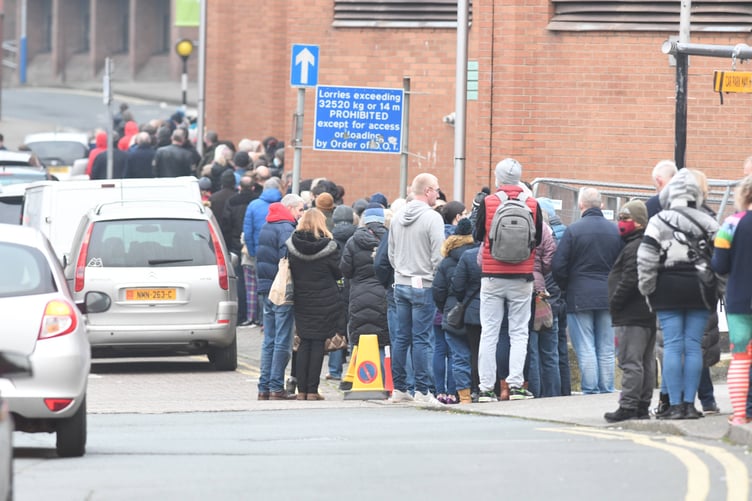A new Covid variant, an urgent vaccination programme and the possibility of new restrictions - thanks to the Omicron variant, 2021 is ending almost exactly as it began.
THE OMICRON VARIANT
Despite wall-to-wall coverage there is still a lot of uncertainty about Omicron. It’s barely four weeks since it was given a name and declared a ’variant of concern’ by the World Health Organisation.
What is clear is that the variant is highly transmissible and is causing infections in people who are already vaccinated, or who have recovered from a prior Covid-19 infection.
Vaccines appear to be less effective at preventing infection and mild disease from Omicron. But vaccination, especially with a booster jab, still offers enormous protection against severe illness.
Originally detected in South Africa, the first two cases were identified in the UK on November 27. By December 15 more than 100,000 new infections (a mix of Delta and Omicron) were detected in a single day in the UK. There are some indications that Omicron causes milder disease than other variants, but this effect could be counteracted by its sheer transmissibility.
The usually understated Professor Chris Whitty, chief medical adviser to the UK Government, described Omicron’s spread as ’quite staggering’.
RESTRICTIONS
Apart from a modest package of (largely advisory) measures introduced in late November, no additional restrictions have been imposed to date in the Isle of Man.
The first Omicron cases arrived in the island on December 10. As the Courier went to press on Wednesday, 251 probable cases of Omicron had been detected, almost double the 126 cases reported by Chief Minister Alfred Cannan on Monday.
Mr Cannan said that the Council of Ministers would not be afraid to impose further restrictions, up to a circuit-break lockdown, if the pressure became too great on the island’s key services. ’Nothing can be ruled out in these circumstances,’ he said.
For our neighbours around the Irish Sea, a patchwork of different restrictions are coming into force: the Irish government has implemented a mandatory 8pm closure of hospitality venues until the end of January.
New rules will come into force on Boxing Day in both Scotland and Wales. Further measures are expected to be introduced in England and Northern Ireland after Christmas, but nothing was official as this feature was published.
THE NEW TESTING REGIME
Major changes to the island’s Covid testing regime were made on Wednesday, hinting at what might be to come over the next few weeks.
Firstly, a positive lateral flow test is now sufficient to confirm a covid case. Residents are no longer being sent for a confirmatory PCR test at the Grandstand. Instead they are required to isolate and, in another change, they should inform their close contacts instead of relying on contact tracing services.
This reflects the fact that, as seen in other countries in the last week, the island’s test and trace infrastructure has no chance of keeping up with the speed of the Omicron wave.
Secondly, instead of the automatic 10-day isolation period for confirmed Covid cases, residents may now leave isolation early if they return two negative lateral flow tests taken at least 24 hours apart.
Entire households are no longer required to isolate if there is a suspected Omicron case. This raises the hope that some families can leave isolation in time for Christmas.
These changes might be crucial in keeping the island running over the next few weeks. It could be, thanks to the vaccination and booster programme, that the biggest crisis of the Omicron wave is not the number of hospitalisations or deaths, but the cumulative effect of having hundreds, or even thousands, of essential workers in isolation all at once.
VACCINATION PROGRAMME
The biggest success of the ’Omicron era’ has been the massive expansion of the island’s booster programme.
Walk-in clinics at Chester Street have proved incredibly popular.
A stunning 2,441 booster jabs were delivered on Monday, the first day that they were offered to anyone over 18.
Over 60% of the eligible population has now received a booster.
For anyone over 18, who had their last jab more than three months ago, walk-in booster clinics are taking place daily until Christmas Eve and will restart on December 27. Walk-in primary vaccination (first or second dose) is now also available for those aged 12 or over.
Boosters can also be booked at some of the island’s GPs surgeries.
Last year the island enjoyed a Covid-free Christmas, before the bubble dramatically burst with the arrival of the Alpha variant.
Thanks to the Omicron we will enter 2022 in similar style. In a race between vaccines and a new, more transmissible variant, with the spectre of new restrictions being imposed as a last resort.
The next few weeks could be as unpredictable as anything we have experienced in the pandemic so far.




